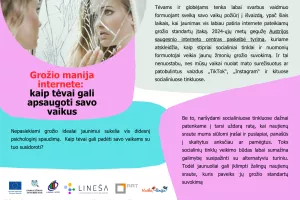Unattainable beauty ideals are putting young people under increasing pressure. How can parents support their children in dealing with this?
Advices for parents:
- Don't condemn or ban the use of social networking sites, but work with them to be critical of the content they use. For example, discuss the examples they admire online and point out that Instagram, TikTok and other social networking sites are almost free of unedited photos and that most content is edited.
- Talk to young people about how social networks work: not everyone is yet aware that opinion leaders are heavily rewarded for promoting products and that there has been a recent explosion in the number of images created by artificial intelligence that are not photos of real people.
- When praising children, try not to focus on appearance, such as "That dress makes you look slimmer!" It is also important that praise is not limited to appearance, but also highlights the strengths of the young person's character.
- Explore reality together: Take the young person out into the street and see what people really look like. Compare pictures of real people with pictures on social networks.
- Use social networking sites responsibly. If the content you see is upsetting, ignore it and look for more appropriate content.
- Take a break from social media: make it a tradition with your young people to spend a day or weekend away from their smart devices and do something fun!
Material based on information from the Austrian Safer Internet Centre.
About this resource
Unattainable beauty ideals are putting young people under increasing pressure. How can parents support their children in dealing with this?
Advices for parents:
- Don't condemn or ban the use of social networking sites, but work with them to be critical of the content they use. For example, discuss the examples they admire online and point out that Instagram, TikTok and other social networking sites are almost free of unedited photos and that most content is edited.
- Talk to young people about how social networks work: not everyone is yet aware that opinion leaders are heavily rewarded for promoting products and that there has been a recent explosion in the number of images created by artificial intelligence that are not photos of real people.
- When praising children, try not to focus on appearance, such as "That dress makes you look slimmer!" It is also important that praise is not limited to appearance, but also highlights the strengths of the young person's character.
- Explore reality together: Take the young person out into the street and see what people really look like. Compare pictures of real people with pictures on social networks.
- Use social networking sites responsibly. If the content you see is upsetting, ignore it and look for more appropriate content.
- Take a break from social media: make it a tradition with your young people to spend a day or weekend away from their smart devices and do something fun!
Material based on information from the Austrian Safer Internet Centre.
About this resource
- beauty standards body image
Related content
- < Previous resource
- Next resource >
- < Previous
- Next >







